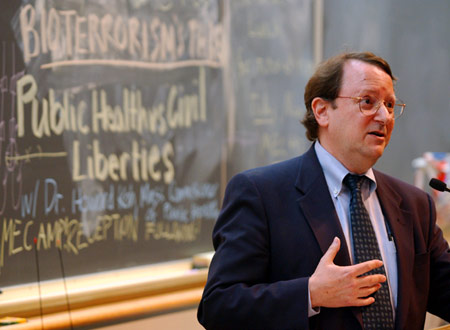The other dangers of bioterrorism
Panel discusses balancing security with freedom

The recent anthrax scare and continuing threat of bioterrorism is prompting the revision of sometimes antiquated public health laws, but experts caution that drafters have to carefully consider whether the new laws trample civil liberties in efforts to protect public health.
Public health laws give sometimes sweeping powers to impose quarantines on populations exposed to disease, isolate people who’ve contracted disease, and impose mandatory treatment and vaccinations for a variety of illnesses. Problems have arisen, however, when prejudice, perception, and personal opinion influence the response to outbreaks. In those cases, the victims of those misdirected responses have often been America’s underclass.
The complex balancing act of public good and civil liberty was explored Tuesday afternoon at Harvard Medical School’s Tosteson Medical Education Center in a Medical Ethics Forum, “Bioterror’s Threat: Public Health vs. Civil Liberties.”
The centerpiece of the panel discussion was a “model law” drafted by the Johns Hopkins Center for Law and the Public’s Health for use by state legislatures across the country in redrafting their own public health code.
The panel included Massachusetts Commissioner of Public Health Howard Koh and director of the Johns Hopkins Center for Law and the Public’s Health Stephen Teret. It also included Northeastern University Professor of Health Law Wendy Parmet, and Nicholas King, the J. Elliot Royer Postdoctoral Fellow in the Department of Anthropology, History and Social Medicine at the University of California at San Fransisco. Nancy Kass, the Phoebe Berman Professor of Bioethics and Public Health at the Johns Hopkins Bloomberg School of Public Health, moderated the event.
In discussing possible revisions to public health laws, both Teret and Koh stressed the importance of safeguards to civil liberties and the high level of public threat needed to invoke such emergency powers. Koh said the Massachusetts laws, which give sweeping powers to the governor, have been used sparingly – just three times in the last 25 years. Though he didn’t cite abuses of the laws, he said they are overly broad and, not updated since 1905, are in need of revision.
“It’s absolutely clear we have to strike a critical balance, keep the threshold for declaring a public health emergency quite high,” Koh said.
Teret outlined the model law, which is just an example for use by state legislatures in their deliberations. Teret said the toughest part of drafting the law was striking an appropriate balance between protecting public health and protecting individual rights.
The legislation defines a public health emergency, which Teret said is really for extreme cases, such as outbreaks of deadly exotic illnesses and not for such things as the yearly battle with the flu, which, though routine, takes 10,000 lives each year in this country, he said.
The legislation also urges states to begin a planning process on how to handle such an emergency, so the infrastructure is in place long before it is needed. As far as quarantine and isolation, the legislation would require authorities to use the least restrictive means possible, while maintaining the dignity of those affected, as well as ensuring their access to food, clothing, medical supplies, and communication with the outside world.
“We tried to take great care with regard to the rights and interests of individuals while at the same time giving the public health community the tools they need,” Teret said.
That care may not be enough, however. King said that laws drawn with the purest intentions and with what was thought of as clear-eyed foresight have gone awry in the past. He cited several historical cases to illustrate abuses of public health laws – usually against poor, unempowered classes in America.
Chinese immigrants, he said, were quarantined en masse in a plague scare in 1900; Irishwoman Mary Mallon – better known as Typhoid Mary – was isolated for decades in New York when it was discovered she was a carrier of typhoid; and patients in a tuberculosis sanitarium were put in isolation as much for unruly behavior as for public health reasons.
“Public health responses that seem clear at the time of drafting often have messy, unintended, long-term consequences,” King said.
Other dangers of uneven application of health laws, he said, are things like stigmatization of populations, usually poor, seen as dirty or more susceptible to disease. Such responses can actually deter people from seeking care, for fear of being labeled with the disease. With bioterror, King said, afflicted people will not only be seen – as they were in the past – as “carriers,” but as potential suspects, until authorities determine how they have been exposed.
King also raised a red flag at provisions that would lead to greater cooperation between the health-care community and law enforcement and questioned the danger to civil liberties and privacy when pharmacies and health insurance companies share information with investigators.
One panelist, Parmet, questioned whether a revision of the laws is needed at all. In talking first about quarantine and isolation and taking aim at individual liberties, lawmakers are looking for the cheap, easy way out of the problem, Parmet said. The real answer is greater oversight and regulation of vulnerable industries and protection of food and water supplies. “Modern quarantine laws are cheap, but industries lobby heavily when efforts are made to increase oversight and monitoring,” Parmet said.
A better solution, she said, is to work to protect vulnerable industries and increase resources to the public health community so it is better prepared to deal with a public health emergency.
“Restricting civil liberties should be a last resort, not a first resort,” Parmet said.




